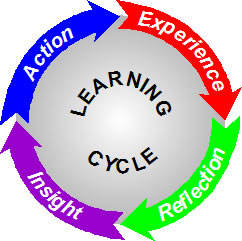| What is experiential learning? |
| |
“Experiential learning is a teaching and learning process that combines direct experience that is meaningful to the student with guided reflection and analysis. It is challenging, active and student centered and immerses students in opportunities for taking initiative, responsibility and decision making. It is a holistic approach to learning that connects the head with the body, heart, spirit and soul. Traditional academic approaches to education focus primarily on the intellectual development of the individual while experiential education methods focus on the whole person” (Kolb) |
| What is the experiential learning cycle? |
| |
Few people learn well through theoretical examination and lecture only. That is why we utilize the experiential learning process.
What do we mean by that? Take a look at the Experiential Learning Cycle below. If you look around the circle, you will discover that this is an attempt to join together the actual experiences of life with the theoretical acquisition of knowledge. Unfortunately, most formal learning today concentrates mainly on the acquisition of knowledge. The rest of the cycle dealing with real life is ignored.
 In the experiential learning process, participants should never be more than a few minutes away from trying out a new concept in a simulation or experiment and never more than half a day away from utilizing it in real life situations. In fact the learning process is as important as the information learned. In the experiential learning process, participants should never be more than a few minutes away from trying out a new concept in a simulation or experiment and never more than half a day away from utilizing it in real life situations. In fact the learning process is as important as the information learned. |
|
| |
You will notice the four stages of this cycle reflected in this model. The cycle almost always begins up at the top with Experience. We are interested in all of the experiences that each person will have whether at home, school, with friends … or during the meeting times of this program. This curriculum encourages us to move from experience to Reflection. This is the debriefing stage when we ask questions about what has happened to us in our experiences. From these questions we can begin to formulate learnings and new concepts. This is the Insight stage. From this point we move naturally to Action … putting the new learning to the test. This then provides for additional Experience and the cycle continues on. |
| What is my role as a faciliator? |
| |
a safe, warm, accepting, challenging atmosphere
respect each person’s knowledge, experience and expertise
a no guilt, low pressure learning environment
an understanding that learning is a journey
the qualities of servant leadership |
| What does an effective facilitator look like? |
| |
Learner centered more than teacher centered
Trusting (the process and the learners)
Ability to deal with the ambiguity and tension of the process
Friendly, flexible, open, listening attentively, explaining clearly,
Skillful observer, asking thought-provoking questions
Some measure of appropriate self-disclosure
Consciously eliminating stereotypes and biases
Open and honest
Competent and sensitive in communication skills
Responding positively to learner’s comments
Attentive, expressive, enthusiastic, clear, and organized
Showing personal interest in the learners
Comfortable with mistakes ... silence |
| Are experiential exercises the same as games? |
| |
No … games are for high energy, fun and getting people involved. If they are boring or un-fun then they are not successful. Experiential exercises lead us into experiences that are designed for learning through debriefing the experience and gathering insights for future action.
Often, experiential exercises have all of the best qualities of good games (high energy, fun, people involvement) but sometimes they don’t. Sometimes an experiential exercise causes some level of stress and this can be uncomfortable for people, but … it creates the best environment for real learning. Another difference is that games are very task/goal oriented. They tend to be competitive and there are usually winners and losers. Experiential exercises are designed to emphasize the experience itself not the goal of completing the task.
So … don’t worry about whether people “like” the experiences .. or whether they like you for that matter. Your job is to facilitate learning … not to make everyone happy all of the time. Don’t go for competition and goal achievement .. learn to become an observer of the process. Look for what can be learned through whatever happens … planned or unplanned. | |